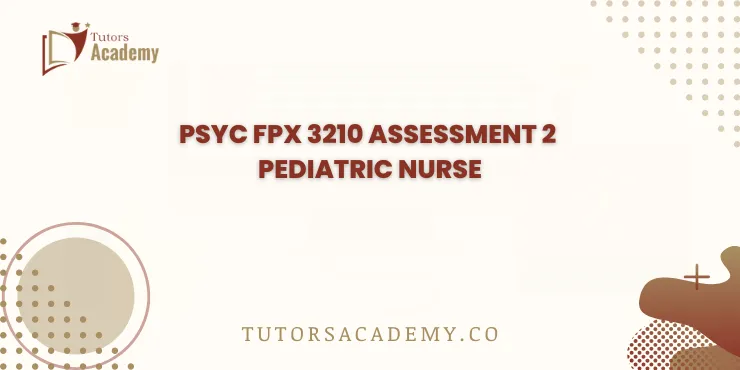
- PSYC FPX 3210 Assessment 2 Pediatric Nurse.
Comprehensive Pediatric Care for Growing Minds and Bodies: Pediatric Nursing at Riverbend City Child Development Center

Pediatric Nurse
Specific Audience of Parents with Young Children
The brochure targets parents of young children seeking comprehensive healthcare services. These parents prioritize their children’s health, developmental milestones, and emotional well-being. They are particularly interested in early interventions, tailored care plans, and professional guidance to ensure their child’s physical and cognitive development remains on track.
Differentiating Psychology from Other Disciplines
Psychology focuses on understanding human behaviour, emotions, and cognitive processes, unlike other disciplines, such as medicine, which prioritizes physical health (Hu et al., 2021). Psychology offers insights into mental and emotional development, using therapeutic techniques and research-based interventions, distinguishing it from disciplines that mainly address biological or physical concerns.
Key Characteristics of a Cognitive Service
A cognitive service emphasizes enhancing a child’s learning, problem-solving, and memory skills through activities like cognitive behavioural therapy or educational interventions (Wan et al., 2020). It aims to strengthen critical thinking and adaptive behaviours, focusing on how children process information, make decisions, and apply knowledge to overcome developmental challenges.
Value and Limitations of Psychological Theory in Lifespan Development
Psychological theories provide valuable frameworks for understanding growth across life stages and offering tailored interventions. However, their limitations include rigid categorization, as individual development may not always align with theoretical stages (Zacher & Froidevaux, 2021). These theories may also overlook cultural and environmental factors influencing a child’s development trajectory.
PSYC FPX 3210 Assessment 2 Pediatric Nurse
- What benefit does this service offer children?
The Pediatric Nurse service provides essential health monitoring, early detection of developmental or medical concerns, and personalized care plans for children. It promotes physical and emotional well-being, ensuring children receive age-appropriate healthcare support that fosters optimal growth and development in a nurturing environment (Buckley et al., 2020).
- What theory or perspectives do these services use?
The Pediatric Nurse service draws from developmental theories, such as Piaget’s cognitive development and Erikson’s psychosocial stages, emphasizing age-appropriate care and support (Forsyth et al., 2022). It also integrates family-centered care perspectives, focusing on collaboration with families to ensure comprehensive, individualized care that promotes children’s overall health and developmental milestones.
- What are the strengths and weaknesses of this theory or perspective?
Developmental theories have strengths, including a structured understanding of children’s growth, which enables tailored, age-specific care. Family-centred care strengthens family involvement in decision-making (Hamama‐Raz et al., 2020). However, weaknesses lie in the rigidity of developmental stages, which may not account for individual variations, and potential overreliance on family dynamics, which can vary widely.
- How is this service different from the others offered (why choose one over the other)?
The Pediatric Nurse service offers direct, specialized medical care and health monitoring, addressing physical and developmental needs in one service (Liao et al., 2022). Unlike mental health or therapy services, it provides holistic, preventative healthcare that supports children’s overall well-being, ensuring early detection and intervention for health concerns.
Confidentiality, Therapy, and Ethical Considerations
Confidentiality ensures that a child’s health information is protected and shared only with authorized individuals. Exceptions include cases where harm or abuse is suspected, which must be reported to authorities for the child’s safety (Quigley et al., 2022). Read more about our sample PSYC FPX 3210 Assessment 1 Analyzing Sources Worksheet for complete information about this class.

PSYC FPX 3210 Assessment 2 Pediatric Nurse
Ethical considerations include informed consent, transparency, and prioritizing the child’s best interests while maintaining clear communication with parents about treatment plans.
References
Buckley, L., Berta, W., Cleverley, K., Medeiros, C., & Widger, K. (2020). What is known about paediatric nurse burnout: A scoping review. Human Resources for Health, 18(1). https://doi.org/10.1186/s12960-020-0451-8
Forsyth, L. A., Lopez, S., & Lewis, K. A. (2022). Caring for sick kids: An integrative review of the evidence about the prevalence of compassion fatigue and effects on pediatric nurse retention. Journal of Pediatric Nursing, 63, 9–19. https://doi.org/10.1016/j.pedn.2021.12.010
Hamama‐Raz, Y., Hamama, L., Pat‐Horenczyk, R., Stokar, Y. N., Zilberstein, T., & Bron‐Harlev, E. (2020). Posttraumatic growth and burnout in pediatric nurses: The mediating role of secondary traumatization and the moderating role of meaning in work. Stress and Health. https://doi.org/10.1002/smi.3007
Hu, J., Peng, Y., Chen, X., & Yu, H. (2021). Differentiating the learning styles of college students in different disciplines in a college English blended learning setting. Public Library of Science, 16(5). https://doi.org/10.1371/journal.pone.0251545
Liao, H., Liang, R., He, H., Huang, Y., & Liu, M. (2022). Work stress, burnout, occupational commitment, and social support among Chinese pediatric nurses: A moderated mediation model. Journal of Pediatric Nursing. https://doi.org/10.1016/j.pedn.2022.10.009
Quigley, D. D., Slaughter, M. E., Qureshi, N., Gidengil, C., & Hays, R. D. (2022). Associations of pediatric nurse burnout with involvement in quality improvement. Journal of Pediatric Nursing, 70. https://doi.org/10.1016/j.pedn.2022.11.001
Wan, S., Gu, Z., & Ni, Q. (2020). Cognitive computing and wireless communications are on the edge of healthcare service robots. Computer Communications, 149, 99–106. https://doi.org/10.1016/j.comcom.2019.10.012
Zacher, H., & Froidevaux, A. (2021). Life stage, lifespan, and life course perspectives on vocational behavior and development: A theoretical framework, review, and research agenda. Journal of Vocational Behavior, 126, 103476. https://doi.org/10.1016/j.jvb.2020.103476
